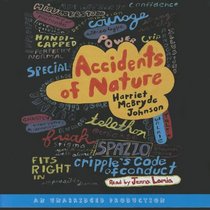What an interested "read!" While there were a couple parts in the end where I felt it could have ended at a nice place, it was overall a heartfelt read. I really felt connected to Jean and Sarah and the gang. As a kid who always went to camp myself, I totally got it and it really drew me in.
LOVED this book. Wonderful book to make you think about being human, human rights, human commonalities and differences, human connections. Loved the perspectives from the main characters, it was extremely touching, easy to relate to, and thought-provoking.
Reviewed by Mechele R. Dillard for TeensReadToo.com
Jean feels fantastic about her place in the world. Why shouldn't she? She's seventeen, an honor student at Crosstown High School, her friends are great, and her family supports all of her dreams. But this summer, Jean spreads her wings, away from the cocoon of her parents, friends, and her small town, and spends time at Camp Courage--"Crip Camp," as the campers sarcastically refer to it--a camp for children with physical and mental disabilities, and she finds her confidence is shaken. For the first time, Jean must admit that, because of her cerebral palsy, she is different from the other kids at her high school.
Set in 1970 with an epilogue to bring the reader into the year 2000, ACCIDENTS OF NATURE is an excellent overview of how kids with a range of challenges--cerebral palsy, muscular dystrophy, amputations, autism, asthma, multiple sclerosis, epilepsy--feel condescended to by the world. For example, to make sure no one feels bad at the camp carnival, everyone wins a prize at the games. Jean and her friend Sara refuse to play, on the basis that there is no challenge in playing a game if one is certain to win. The games then become a metaphor for Crip life, as Jean muses:
"When the games are rigged, does it make everyone a winner--or no one? I believe in competition. The program seems to be that handicapped people aren't up to it; we can only pretend to be winners. I don't want to pretend. I want to achieve, really achieve. Or I will take my disappointments just like anyone else."
Johnson captures the pain, anger, and fear of being shunned by the "normal" world in the character of Sara, and explores the naivete of thinking that no one notices one's differences in the character of Jean. Weaving the two together through the bond of friendship, Johnson creates a captivating, educational storyline.
The overwhelming negative of this book--and the reason I am awarding four stars instead of five--is the epilogue. Without giving away the ending, I'll say that I'm not sure what the author was thinking when she wrote this epilogue; I can think of no other way to describe it but as frustrating, aggravating, and absolutely annoying. Ms. Johnson, what were you thinking?
Still, ACCIDENTS OF NATURE is an excellent book, overall, and well worth a reader's time; I recommend it with a strong four stars.
Jean feels fantastic about her place in the world. Why shouldn't she? She's seventeen, an honor student at Crosstown High School, her friends are great, and her family supports all of her dreams. But this summer, Jean spreads her wings, away from the cocoon of her parents, friends, and her small town, and spends time at Camp Courage--"Crip Camp," as the campers sarcastically refer to it--a camp for children with physical and mental disabilities, and she finds her confidence is shaken. For the first time, Jean must admit that, because of her cerebral palsy, she is different from the other kids at her high school.
Set in 1970 with an epilogue to bring the reader into the year 2000, ACCIDENTS OF NATURE is an excellent overview of how kids with a range of challenges--cerebral palsy, muscular dystrophy, amputations, autism, asthma, multiple sclerosis, epilepsy--feel condescended to by the world. For example, to make sure no one feels bad at the camp carnival, everyone wins a prize at the games. Jean and her friend Sara refuse to play, on the basis that there is no challenge in playing a game if one is certain to win. The games then become a metaphor for Crip life, as Jean muses:
"When the games are rigged, does it make everyone a winner--or no one? I believe in competition. The program seems to be that handicapped people aren't up to it; we can only pretend to be winners. I don't want to pretend. I want to achieve, really achieve. Or I will take my disappointments just like anyone else."
Johnson captures the pain, anger, and fear of being shunned by the "normal" world in the character of Sara, and explores the naivete of thinking that no one notices one's differences in the character of Jean. Weaving the two together through the bond of friendship, Johnson creates a captivating, educational storyline.
The overwhelming negative of this book--and the reason I am awarding four stars instead of five--is the epilogue. Without giving away the ending, I'll say that I'm not sure what the author was thinking when she wrote this epilogue; I can think of no other way to describe it but as frustrating, aggravating, and absolutely annoying. Ms. Johnson, what were you thinking?
Still, ACCIDENTS OF NATURE is an excellent book, overall, and well worth a reader's time; I recommend it with a strong four stars.




